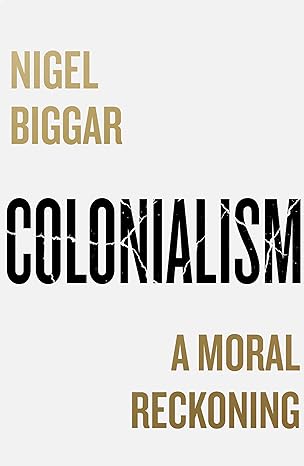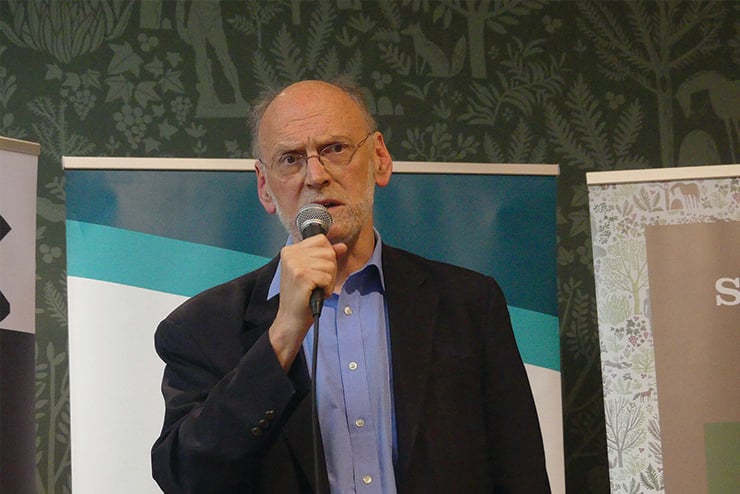Today’s anti-colonial narrative ignores the peace, justice, order—and even the abolition of slavery—that the British Empire brought to the world.

Colonialism: A Moral Reckoning
by Nigel Biggar
William Collins
480 pp., $34.99
Ideologues are often performative, but sometimes they are simply pantomimic. One of today’s major stock villains is the British Empire—seen in melodramatic minds as a swaggering dastard, slashing through global history like Captain Hook in murderous search of Peter Pan and treasure, and whose malign legacy can be blamed for many modern ills. Attitudes toward the empire have certainly evolved since 1922, when George Santayana could argue seriously in Soliloquies in England that “never since the heroic days of Greece has the world had such a sweet, just, boyish master.”
Oxford ethicist Nigel Biggar got drawn into this debate in 2017, when he wrote a piece in the Times of London commending Bruce Gilley’s apoplexy-inducing Third World Quarterly article, “The Case for Colonialism.” He had waded in these waters before, when impassioned activists demanded the removal of all memorials of Cecil Rhodes, including Oxford’s prestigious Rhodes Scholarship, on the grounds that he had been responsible for rapine in southern Africa. Biggar had also convened a comparative educational project called “Ethics and Empire,” which was inevitably caricatured as an attempt to whitewash Britain’s imperial record. He has formerly criticized human rights and made a Christian case for “just wars.”
Naturally, Biggar has been threatened by the excitable Twitterati for his temerity in taking a sophisticated view of history and denounced by academic “colleagues,” who bravely cosigned letters upholding elite opinion. Biggar was therefore grateful when the respected publisher Bloomsbury commissioned him to write a dissenting book. Bloomsbury then had prudent second thoughts because of “public feeling,” but happily a less pusillanimous publisher stepped in.
This book is about the British Empire, so anyone expecting exculpation of, say, Magellan (who as a colonizer is under threat of excision from the astronomical atlas) will be disappointed. It is nevertheless relevant to all Western nations, whose records and even existences faux-radicals find repugnant, and whose resources they seek to capture by exploiting post-Christian feelings of guilt. Biggar worries that if Britain becomes demoralized by endless cultural-historical criticism, it may become psychologically unfit to play a role on the world stage.
As a small island with a growing population skilled in navigation and galvanized by both ambition and curiosity, Britain was always going to accrue an empire, especially once rival powers started accumulating overseas possessions. Contrary to postcolonial conspiracy theories, this centuries-long endeavor was not centrally driven, nor motivated by simple greed and a lust for power. In truth, the British Empire grew adventitiously, sometimes almost accidentally and through many, sometimes conflicting, motives: cultural, economic, military, personal, political, royal, and strategic. As the Liberal Party historian J. R. Seeley reflected in his 1883 book The Expansion of England, “We seem, as it were, to have conquered and peopled half the world in a fit of absence of mind.”
Even actions seen now as uniformly negative were often carried out with partly good intentions. In 1831, Maori chiefs of New Zealand petitioned King William IV for official protection against private settlers and the French; the now excoriated 1840 Treaty of Waitangi was an inevitable outcome. Cecil Rhodes’ 1891 establishment of an official British presence in Matabeleland was similarly intended to prevent an inflow of unscrupulous concessionaries. The 1897 raid on Benin in Africa was at least partly designed to halt human sacrifice. The Boer War was caused partly by British dislike of Afrikaners’ treatment of Africans.
Those who scoff cynically at such explanations as self-serving are often uncritically trusting of oral histories of native societies, swallowing whole such sentimental ideas as their being egalitarian and Edenic, pacific and unspoiled. Biggar has sardonic fun with some naive notions: “The natives had plenty of experience of the alienability of land,” he writes, “since they were intermittently pushing each other off it.”
Some colonizers brought unmitigated benefits. Edmund Burke’s bête noire, Warren Hastings, India’s governor-general between 1772 and 1785, was fluent in Bengali, spoke some Urdu and Persian, and pioneered the scholarly revival of Sanskrit (possibly ensuring its survival). He was only one of many intellectually inclined Englishmen who beguiled sweaty spare time expanding knowledge of, and perpetuating, the captivating cultures surrounding them. All such earnest interest is now flippantly dismissed as condescending “Orientalism” or “cultural appropriation” when it was really cultural appreciation.
Other colonists brought modernity, often greatly welcomed. In India (which the British united), the incoming authorities erased the custom ofsuttee, whereby widows of the recently deceased were immolated along with their late husbands, and eliminated the murderous thuggee cult. The stereotypically class-bound British also strove mightily against the Hindu caste system, which locked millions of unfortunates into “untouchable” status.
Imperial troops saved countless lives by separating mutually antipathetic Hindus and Muslims, although this is forgotten in justifiable criticism for the horrors of 1947’s Partition of India. Indians also got thousands of miles of roads, the world’s largest railway network, vastly improved education, law and medicine, a civil service, an army—and cricket. Many natives became rich thanks to imperial opportunities. And Third World Christians owe their faith to European evangelists. Even the angriest anti-imperial ideologies are grounded in Western political theory.
British rule was often a better guarantor of peace and justice than any other. Even at its nadirs, there was some degree of imperial accountability, hitherto usually absent. In 1919, after Brigadier General Reginald Dyer’s local levies opened fire on an unarmed crowd in Amritsar, killing and wounding hundreds, Dyer was forced to resign, and compensation was paid to victims and families. In 1959, after 11 Mau Mau insurgents were beaten to death in a Kenyan prison camp, there were passionate denunciations in Parliament (notably by Enoch Powell), and shortly afterwards all the detention camps were shut down. The fact that colonial government could be administered by so few (in 1939, the ratio of Britons to Africans in British tropical Africa was 1 to 18,432) implies that most imperial subjects consented to be governed.
It is often asserted that colonialism and slavery are essentially synonymous, and many of England’s famous country houses were therefore built with blood money. Biggar cites credible studies showing that slavery was not as economically important as is assumed; according to one, it contributed under 1 percent of total domestic investment around 1790. He naturally reprehends the activities of the Elizabethan sailor-speculators who initiated the triangular transatlantic trade (slaves from Africa to America, revenue and American goods to England, slaving expeditions back to Africa). But he reminds readers that slavery is as old as mankind and hardly unique to England; the Portuguese actually played a larger part in New World slavery. It is not callow “whataboutery” to remember that indentured English and Irish people often lived in even worse conditions than slaves.
The British and the Royal Navy later made some kind of recompense by almost extirpating the global slave trade, at great expense to the Treasury. Slave owners were controversially compensated, but even leading abolitionists supported this as expediting the end. In 1861, the British made Lagos in Nigeria an imperial colony, chiefly for the purpose of destroying its slave trade. The Mahdists of Sudan rose against the British in 1883 partly because the British were stamping out Arab enslavement of black Africans.
There was a sense of British superiority within its colonies, but this was complacent rather than persecutory, and culturally rather than racially rooted. It was based on scientific or technological comparators, religious idealism, or liberal notions about progress. The empire was in no wise democratic, but nor was England for most of its history. In any case, introducing democracy in the colonies could have imperiled resented minorities, like Egypt’s Christians. Feelings of exceptionalism surfaced, but often only after some striking reminder of vulnerability, such as when thousands of sepoys rose up in the Indian Mutiny of 1857 and slaughtered British colonists, including women and children. But even at the lowest moments, there were always powerful voices, including Queen Victoria’s, urging kind treatment of the natives.
The empire was never institutionally racist, as is lazily alleged, although many colonists were personally prejudiced, and there were informal barriers, like private club membership rules. It was widely (perhaps wishfully) assumed that natives could and would assimilate, and become honorary “English” through example. The tragic cases of Newfoundland’s Beothuk people and the aborigines of Tasmania are frequently adduced as evidence of genocidal intentions. While there were undoubtedly outrages, there was no systematic extirpation. Inadvertently introduced epidemics and intertribal conflicts seem likelier causes in pushing these always small populations to extinction’s edge.
All of us judge our ancestors, but Biggar reminds us that we must understand their ethical and historical constraints, and make allowance for human frailty. If we cannot always be proud of previous generations, nor is there reason to feel ashamed. Old ills cannot usually be undone, anyway, as the author sadly notes: “History contains an ocean of injustice, most of it unremedied and now lying beyond correction in this world.” This is a wise and informative book, indeed, and a welcome corrective to the bad-tempered and distorted anti-colonial orthodoxy.

Leave a Reply